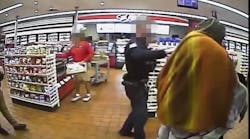Internal e-mails sent between the St. Paul Police Department's crime lab staff and superiors show a push for reformation soon after two public defenders began questioning the lab's credibility last March.
E-mails released Wednesday indicate that the department started trying to rectify issues even as the full extent of the lab's problems remained unclear. The correspondence was dated between March and June 2012, the months just before contentious courtroom testimony in July that forced major changes in the lab, suspension of its drug testing and outside review of all its work.
"Training has been lacking in that unit for a number of years and is an issue now," Assistant Chief Kathy Wuorinen wrote to Chief Thomas Smith on April 28. "There have been advancements in a number of areas that we have not kept up on. One of my goals is to get current our lab tech training and keep current with new trends."
Public defenders Lauri Traub and Christine Funk met with lab criminalist Kari McDermott on March 30. She told them that no margin of error was taken into account when weighing suspected drugs, no record was kept of when solvent expired and that she was unsure whether the lab conducted validation studies -- a quality insurance measure. "This horrifies her," according to court documents.
The attorneys soon filed a motion to suppress the lab's drug test results in select Dakota County cases, citing a lack of scientific credibility.
Lab staffers, which included sworn officers and civilians, and police leadership met in the wake of the inquiry. Police spokesman Howie Padilla said the changes and meeting were not necessarily prompted by or specifically about the attorneys' challenge.
Many of the issues in the e-mails, including exploration of accreditation, drafting of standard operating procedures and staff training, were in line with the lab's work and goals long before Traub and Funk's inquiry, he said.
Correspondence shows that members of the department were apprehensive.
"It won't be a smooth transition to any change, as there is already fallout from yesterday's meeting," Sgt. Greg Gravesen, the lab's crime scene reconstructionist, wrote to Wuorinen on April 27.
On April 30, Gravesen wrote to Wuorinen again. "The people in the lab are buzzing about the meeting. There will be apprehension to being open with sergeants present. They may have things that [then-lab director Sgt. Shay Shackle] and I are doing that could be improved, but they won't say because of fear of retaliation."
Gravesen requested a private meeting with Wuorinen earlier that month because of his "serious concerns about the situation and specifically how they may potentially affect me and my career."
On May 3, officer Jamie Sipes, who works in the lab, wrote Wuorinen: "I have seen a positive change in attitudes and a genuine excitement about the future. I don't want to be a part of our current dysfunction ... It is my sincere concern and observation that not all of us are on board with this plan."
"I appreciate it and do want to see change for the better in the lab," Wuorinen replied. "I wasn't kidding when I said those who don't jump on board will not be staying."
Gravesen and Sipes remain with the lab, although Chief Smith removed Shackle as lab director in July when testimony revealed that there was no vetting of questionable results, no documentation of testing procedures and poor maintenance of testing instruments.
All work in the lab was suspended last year, and two outside contractors were hired to review and revamp its work. Fingerprint analysis recently resumed and is being conducted by a certified analyst, Padilla said.
The department posted a job last week seeking a forensic scientist to manage the lab, a change from having police sergeants supervise its operations. The city has budgeted $1 million for lab improvements.
The testimony prompted authorities in Dakota, Ramsey and Washington counties to turn to the Minnesota Bureau of Criminal Apprehension (BCA) for all drug testing. Many departments relied on St. Paul because of a quicker turn-around time for results, although it charged for testing. The BCA does not charge.
Traub and Funk are seeking to keep BCA tests in the contested cases from being admitted in court because the evidence was first handled by the police lab. They fear the police lab's work is so suspect that the evidence could be contaminated.
The BCA retested evidence from many other cases in the three counties. The BCA's results contradicted St. Paul's findings in two cases, resulting in the dismissal of one case in Ramsey County.
Judge Kathryn Davis Messerich has until March to issue her decision.
Copyright 2013 - Star Tribune (Minneapolis)
McClatchy-Tribune News Service


